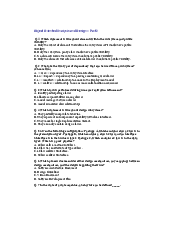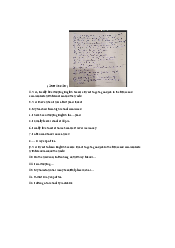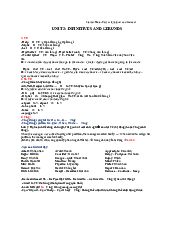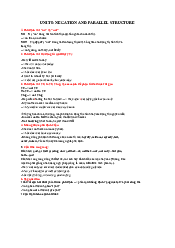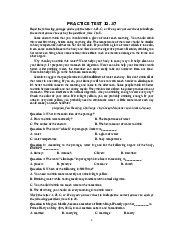





Preview text:
PRACTICE TEST 12.71
Mark the letter A, B, C, or D on your answer sheet to indicate the word that differs from the other
three in the position of primary stress in each of the following questions. Question 1. A. invent B. brighten C. machine D. police Question 2. A. educate B. description C. effective D. artistic
Mark the letter A, B, C, or D on your answer sheet to indicate the word whose underlined part differs
from the other three in pronunciation in each of the following questions.
Question 3. A. handle B. honour C. hero D. heyday
Question 4. A. booked B. pushed C. caused D. matched
Mark the letter A, B, C, or D on your answer sheet to indicate the correct answer to each of the following questions.
Question 5. If I were a millionaire, I around the world. Unluckily, I am not. A. travel B. will travel C. would travel D. travelled
Question 6. By the time her husband came back home, she the meal.
A. had already cooked B. has already cooked C. cooked already D. was cooking
Question 7. I was so happy and excited that I couldn’t stop . A. smile B. to smile C. smiling D. to smiling
Question 8. Tony seldom drinks wine when he is at home with his family, ? A. does he B. doesn’t he C. is he D. isn’t he
Question 9. You should not have driven that car with its brakes out of order. You a serious accident. A. might have B. might have had C. should have D. should have had
Question 10. The existence of such a centre is expected to help ASEAN members facilitate assistance to any country by a disaster. A. hit B. to hit C. hits D. hitting
Question 11. China was the third country in the world to be able to carry out manned space flight. A. independent B. independently C. dependently D. independence
Question 12. Could you me to pay the electricity bill? It will be disconnected if we don’t. A. remember B. require C. refresh D. remind
Question 13. He did not want to his fears and insecurity to anyone. A. expose B. picture C. describe D. escape
Question 14. The police officer said two of the victims were known gang members; the other was an innocent . A. bystander B. standerby C. standing-by D. by-standing
Question 15. You look tired. Why don’t we and have a good rest? A. call its name B. call on C. call it a day D. call off
Question 16. I have only had time to dip the report. A. into B. down C. through D. in
Question 17. My boss is sometimes forgetful the promises he has made. A. with B. at C. to D. of
Question 18. Remember to bring cash with you the store doesn’t accept credit cards. A. in case B. so that C. although D. but 1
Mark the letter A, B, C, or D on your answer sheet to indicate the word(s) CLOSEST in meaning to
the underlined word(s) in each of the following questions.
Question 19. The bully doesn’t have any friends at school as the rest of the students keep away from him. A. behave B. avoid C. attack D. betray
Question 20. The architect was very that his new city plan had let down been turned down. A. disappointed B. satisfied C. emotional D. optimistic
Mark the letter A, B, C, or D on your answer sheet to indicate the word(s) OPPOSITE in meaning to
the underlined word(s) in each of the following questions.
Question 21. We realised that our circumstances were
. They refused to credit us for even a desperate
cent until all our debts were paid up. A. hopeful Β. fearful C. calm D. peaceful
Question 22. Stagnant water around a home should always be removed, as it is a breeding place for mosquitoes. A. Dirty B. Still C. Muddy D. Moving
Mark the letter A, B, C, or D on your answer sheet to indicate the sentence that best completes each of the following exchanges.
Question 23. Mr. Hugh and his students are visiting the zoo.
Mike: “Can I feed the giraffe?”
Mr. Hugh: “ . The sign says: No feeding the animals.” A. I’m afraid not B. Of course, you can. C. I’m sure about that D. I don’t think it works.
Question 24. David invited Sally to his new house and Sally is thanking David for that.
Sally: “Thank you very much for inviting me to your lovely new house.” David: “ .”
A. Nothing. It is expensive. . B You are so polite!
C. Not at all. Make yourself at home.
D. No problem. Sit down, please.
Mark the letter A, B, C, or D on your answer sheet to indicate the underlined part that needs
correction in each of the following questions.
Question 25. Lack of sanitation in restaurants a major are
cause of disease in some areas of the A B C D country.
Question 26. Sam is responsible for
stocking merchandise, writing orders for delivery, and sell A B C D computers.
Question 27. Not only did he
r ead the book but he also
remembered what he had read as well. A B C D
Read the following passage and mark the letter A, B, C, or D on your answer sheet to indicate the
correct word or phrase that best fits each of the numbered blanks from 28 to 32.
Cultural beliefs differ as to whether directness or indirectness is considered positive. In the mainstream
American culture, the ideal (28) of communication includes being direct rather than indirect
(“Ideal” here means that the culture values this style, although not everyone speaks directly). There are 2
several expressions in English (29)
emphasize the importance of being direct: “Get to the
point! Don’t beat around the bush! Let’s get down to business!” These sayings all indicate the
importance of dealing directly with issues rather than (30) them. One way to determine
whether a culture favors a direct or indirect style in communication is to find out how the people in that
culture express disagreement or how they say, “No”. In Japan, there are at least fifteen ways of saying
“No”, without actually saying the word. Similarly, in the Japan, it would be (31) rude to say
directly “I disagree with you” or “You’re wrong”.
J. Many Americans believe that “honesty is the best policy” and their communication style reflects this.
Honesty and directness in communication are strongly related. It is not a surprise; then, to find (32)
that cultural groups misjudge each other based on different beliefs about directness and honesty in communication. Question 28. A. word B. shape C. form D. phrase Question 29. A. that B. what C. whether D. when
Question 30. A. deciding B. supporting C. observing D. avoiding
Question 31. A. recommend B. considered C. accepted D. expressed Question 32. A. out B. in C. about D. up
Read the following passage and mark the letter A, B, C, or D on your answer sheet to indicate the
correct answer to each of the questions from 33 to 37.
Someone sneezes in front of a group of friends and immediately a chorus of Bless you is heard.
Around the globe, versions of this phrase are uttered whenever someone sneezes. When a child sneezes
in China, for example, adults respond with "May you live to be a thousand years old."
Wishing a sneezer well probably originated thousands of years ago. The ancient Greeks wished each
other long life, the Romans good health. Bless you is
believed to be a shortened version of God bless
you, uttered by Pope Gregory during the plague epidemic of sixth-century Europe. As sneezing was one
symptom of this fatal disease, it seems an appropriate response. The idea that sneezing indicates illness
is also seen in the German gesundheit meaning health. This is now used in American English, having
been brought to the USA by German-speaking immigrants in the early 20th century.
Sneeze responses may also have originated from ancient superstitions. People who believed the soul
could escape from the body via the nose during a sneeze would say bless you to keep the soul from
danger. Today, it is known that sneezing is a simple reflex. As well as signaling a cold, it can be
triggered by an allergic reaction or a strong odor. Stepping outside into the sunlight also causes some
people to sneeze. Whatever the cause, bless you is
usually heard, nowadays uttered more as a common courtesy or out of habit.
Question 33. What is the main purpose of the passage?
A. to show how superstitious people are today
B. to explain why people use phrases like bless you
C. to investigate the history of the phrase gesundheit
D. to examine different beliefs about what causes sneezing
Question 34. The word “uttered” in paragraph 1 is closest in meaning to . A. said B. complete C. extreme D. heard
Question 35. According to the passage, Pope Gregory .
A. would say bless you instead of God bless you B. was the first to use to wish a sneezer well. Bless you
C. thought people who sneezes could be ill.
D. used to wish people who sneezed a long life 3
Question 36. The word “This” in paragraph 2 refers to . A. health B. illness C. gesundheit D. sneezing
Question 37. According to the passage, people once used to believe a sneeze .
A. could be dangerous to others B. was caused by a reflex
C. made the soul leave the body D. produced a bad smell
Read the following passage and mark the letter A, B, C, or D on your answer sheet to indicate the
correct answer to each of the questions from 38 to 45.
Human beings are plagued by all kinds of diseases and millions of people die from them. Many of
these diseases such as diabetes, polio, whooping cough and diphtheria can be fatal and in the past,
people used to die from them. However, with modern technology and a lot of research, scientists and
doctors have come up with various ways to cure these diseases, and consequently, many lives are saved.
In doing the medical research, doctors have come face to face with many problems. One such
problem is the opposition that comes from animal activists. They are against the inhuman treatment of
animals. They argue that in conducting their medical research, doctors put animals through a very
painful process and this should be stopped. According to the fiercest animal activists, nothing justifies
the use of animals in medical experiments, even if lives might be saved.
To get their message across, animal activists are even willing to resort to the use of violence. Many
animal protection groups, like the Animal Liberation Front (ALF), have broken into laboratories
illegally to 'rescue' animals. They take away whatever animals they can find and free them. These
people also make their case by threatening the researchers. They vandalize medical equipment, and in
the most serious cases, they even use bombs.
In stealing the animals, the activists are actually hindering the progress of medicine. In many cases,
the animals were part of research for the cure for various diseases and visual defects in babies. Cures for
problems that people face, therefore, come slower and in the waiting period, more people die.
Researchers have come up with many cures in the process of working with animals and on animals.
Organ transplants are so common today, but we forget they became only possible after they were tested
on animals. Doctors were able to come up with a cure for river blindness, a disease that affects millions
of people in South America and Africa. These are only a few examples, and there are many more. In
spite of what animal activists think, most researches do not treat animals cruelly. In fact, mistreated
animals which are in agony will affect the quality of research so that results obtained are not really
reliable. Thus, researchers do try to treat animals as well as possible.
In the long run, animal activists can cause serious damage to the future of medicine. With their
persistent campaigning, much of the public supports their cause. People with AIDS or cancer need
doctors to do research to save their lives, and often it is a case where animal research is crucial before any cure can be found.
Question 38. The use of 'plagued' in paragraph 1 suggests that diseases . A. are deadly B. are annoying
C. have just been discovered by scientists
D. have been bothering people for some time
Question 39. The belief of animal activists is that .
A. animals should not be sacrificed in experiments
B. animals should not experience any pain in experiments
C. animals should only be used in experiments that aim to cure human disease
D. animals should be treated well so that it does not affect the quality of research
Question 40. The phrase “resort to” in paragraph 3 is closest in meaning to .
A. turn to something as another choice
B. come to a decision on second thoughts
C. refuse to take drastic action D. take full advantage of 4
Question 41. Thanks to tests on animals, doctors succeeded in . A. discovering river blindness
B. finding a cure for river blindness
C. revealing what animal activists think
D. treating animals as well as possible
Question 42. Which of the following might NOT be the purpose of doing medical research?
A. Finding the cure for diseases
B. Developing medical equipment
C. Making better medicine for the rich
D. Improving the well-being of humans
Question 43. The highlighted word “they” in paragraph 5 refers to . A. researchers B. many cures C. organ transplants D. animals
Question 44. Which of the following statements is NOT true, according to the passage?
A. Fatal diseases like diabetes and AIDS are a thing of the past.
B. A majority of researchers is against cruelty to animals used in research
C. River blindness is a disease that affects millions of people.
D. A result of the campaigning by animal activists is getting the support of the people.
Question 45. Which of the following would the author probably agree with?
A. With modern technology, doctors can now cure all kinds of disease.
B. Animal activists are doing a good job for the community.
C. Organ transplants are impossible unless they are carried out on animals.
D. Animal research is essential to find a remedy for fatal diseases.
Mark the letter A, B, C, or D on your answer sheet to indicate the sentence that is closest in meaning
to each of the following questions.
Question 46. The box was too heavy for Mike to carry on his back.
A. Mike still carried the box on his back in spite of its weight.
B. Because of the weight, Mike couldn’t carry the box on his back.
C. Mike didn’t carry the box on his back because it wasn’t heavy.
D. The heavy box could give Mike strength to carry it on his back.
Question 47. “If I were in your shoes, I would let him go”, she said to me.
A. She suggested that I should let him go.
B. She advised me to wear her shoes and let him go.
C. She would like to be in my shoe to let him go.
D. She let him go because she was wearing my shoes.
Question 48. It is your duty to wash all the dishes this afternoon.
A. Your duty to wash all the dishes this afternoon has been suggested.
B. All the dishes must have been washed by you this afternoon.
C. You are supposed to wash all the dishes this afternoon.
D. It is proposed that this afternoon you wash all the dishes.
Mark the letter A, B, C, or D on your answer sheet to indicate the sentence that best combines each
pair of sentences in the following questions.
Question 49. The boss allowed his staff to make some important decisions. He fostered a spirit of
togetherness and commitment.
A. Fostering a spirit of togetherness and commitment, the boss allowed his staff to make some important decisions.
B. Allowing his staff to make some important decisions, the boss fostered a spirit of togetherness and commitment.
C. Although the boss allowed his staff to make some important decisions, he fostered a spirit of 5 togetherness and commitment.
D. Unless the boss allowed his staff to make some important decisions, he fostered a spirit of togetherness and commitment.
Question 50. They were exhausted. They still tried to continue the journey.
A. They were so exhausted that they could continue the journey.
B. They were exhausted but they could not try to continue the journey.
C. Exhausted as they were, they tried to continue the journey.
D. They tried to continue the journey as they were hardly exhausted. 6
